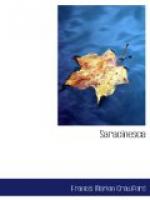“In that case, and should you prefer to contract a marriage of inclination, you will have no difficulty in conferring your title upon your husband, with any reservations you please. Your children will then inherit from you, and become in their turn Dukes of Astrardente. This I conceive to have been the purpose and spirit of the late Duke’s will. The estate, magnificent as it is, will not be too large for the foundation of a new race. If you desire any distinctive title, you can call yourself Duchessa del Carmine d’Astrardente—it would sound very well,” remarked the lawyer, contemplating the beautiful woman before him.
“It is of little importance what I call myself,” said Corona. “At present I shall certainly make no change. It is very unlikely that I shall ever marry.”
“I trust, Signora Duchessa, that in any case you will always command my most humble services.”
With this protestation of fidelity the lawyer left the Palazzo Astrardente, and Corona remained in her boudoir in meditation of what it would be like to be the feudal mistress of a great title and estate. She was very sad, but she was growing used to her solitude. Her liberty was strange to her, but little by little she was beginning to enjoy it. At first she had missed the constant care of the poor man who for five years had been her companion; she had missed his presence and the burden of thinking for him at every turn of the day. But it was not for long. Her memory of him was kind and tender, and for months after his death the occasional sight of some object associated with him brought the tears to her eyes. She often wished he could walk into the room in his old way, and begin talking of the thousand and one bits of town gossip that interested him. But the first feeling of desolation soon passed, for he had not been more than a companion; she could analyse every memory she had of him to its source and reason. There was not in her that passionate unformulated yearning for him that comes upon a loving heart when its fellow is taken away, and which alone is a proof that love has been real and true. She soon grew accustomed to his absence.
To marry again—every one would say she would be right—to marry and to be the mother of children, of brave sons and noble girls,—ah yes! that was a new thought, a wonderful thought, one of many that were wonderful.
Then, again, her strong nature suddenly rose in a new sense of strength, and she paced the room slowly with a strange expression of sternness upon her beautiful features.
“I am a power in the world,” she said to herself, almost starting at the truth of the thought, and yet taking delight in it. “I am what men call rich and powerful; I have money, estates, castles, and palaces; I am young, I am strong. What shall I do with it all?”




